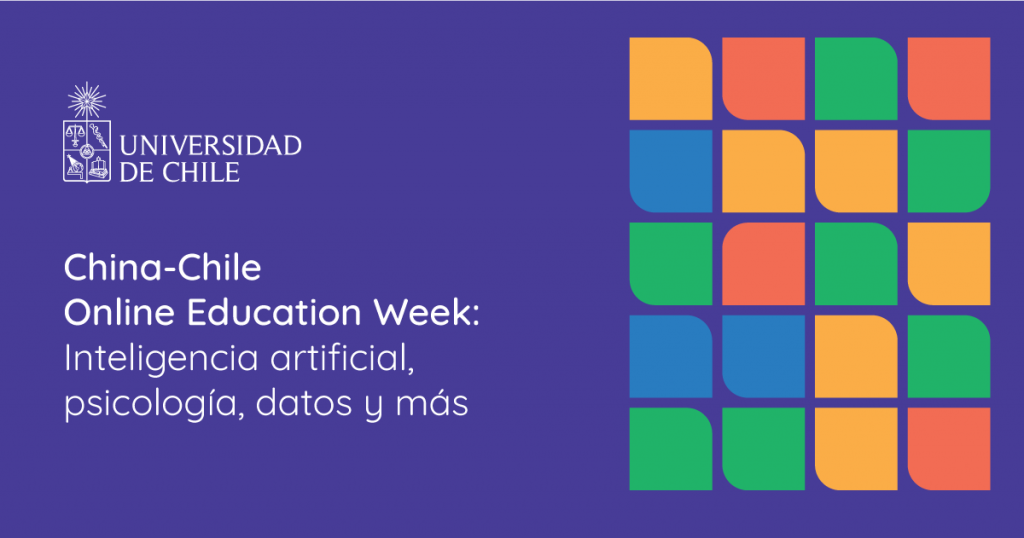
El Departamento de Pregrado de la Universidad de Chile tiene el agrado de hacer extensiva la invitación del Programa de Movilidad Estudiantil (PME), de la Dirección de Relaciones Internacionales, a participar del evento China-Chile Online Education Week, el que contará con cuatro interesantes webinars, realizados por académicas y académicos de China, sobre inteligencia artificial o psicología, entre otros, del 24 al 27 de noviembre.
Los webinars son los siguientes:
Nurturing an AI ecosystem to foster AI talents
Abstract
The nature of artificial intelligence is the interdisciplinary. Therefore, we believe the next breakthroughs of AI will be interdisciplinary endeavors that draw on neuroscience, physics, mathematics, electronic engineering, biology, linguistics and psychology to deliver theoretical, technological and industrial innovations that address complex societal issues and reshape the national industrial system. This talk will give a review of the new generation of artificial intelligence, and then present how to build up an AI ecosystem to foster AI talents in terms of the practices in Zhejiang University via an interdisciplinary manner. In particular, this talk will introduce the AI curriculum of undergraduate students, the AI+X research, the series of AI textbooks published, online AI courses lectured and e-learning platform of wise ocean launched (AI e-learning platform).
Fecha y horario:
24 de noviembre
09:00-10:00 (Santiago,Chile)
20:00-21:00 (Beijing, China)
Prof. Fei Wu, Zhejiang University
Inscripción: https://zoom.us/webinar/register/WN_eMnRHbF4Rb2P3lOqEUwdew
Brief introduction to psychology
Abstract
This course provides a brief introduction to the core concepts in psychology. Psychology has many captivating connections with events in everyday life, from how we see, how we think, to how we feel. In this course, you will learn how psychologists ask questions, evaluate evidence, and form theories that help to explain behavior. Topics include how the mind works, sensation and perception, learning and memory, judgement and decision making, consciousness, and development across the life-span. Class lectures emphasize an empirical approach to a scientific understanding of human behavior across these diverse domains.
Fecha y horario:
25 de noviembre
08:20-10:00 (Santiago,Chile)
19:20-21:00 (Beijing, China)
Prof. Jing Qian, Tsinghua University
Inscripción: https://zoom.us/webinar/register/WN_zs1h4_euSgW7GChhw-7i0A
Data driven biomedical discovery
Abstract
In recent years, data driven approaches have made a variety of contributions to disease analysis combining public data with in-house data in an attempt to increase biomedical understanding. Popular topics include the discovery, prediction, and analysis of disease genes, statistical analysis of SNPs and disease, the prediction and discovery of new drug targets, the development of the disease ontology and its application to the human genome, the analysis of disease related molecular interaction networks, the development of “disease networks”. In this talk we will present recent advances in these areas. Specific examples include: combining genomics and clinical data in cancer biomarker discovery; joint analysis of genomic and imaging features; phenotype driven disease diagnostics; and building disease network using genomic data warehouse. In summary, data driven approach has been playing key roles in translational medicine.
Fecha y horario:
26 de noviembre
09:00-10:00 (Santiago,Chile)
20:00-21:00 (Beijing, China)
Prof. Hui Lu, Shanghai Jiaotong University
Inscripción: https://zoom.us/webinar/register/WN_fMzl7dbUS3mBRpEuyEPnYA
Improving quality of experience for video streaming with AI at network edge
Abstract
Over the Internet, video content has consumed more than 80% of bandwidth. In many countries like China, the number of users watching long- or short-form videos has exceeded 600 millions. However, the high-speed mobile access network, congested backboned network, and under-construction edge networks cannot fulfill the demands in video streaming from Internet users. Hence, it is still challenging to improve the quality of experience of watching a video online. To address the problem, it is promising to have artificial intelligence (AI) techniques for enhancing the video streaming services, e.g., to predict the popularity of video content in the future, to characterize the dynamics of network bandwidth, and to analyze the user behaviors. Key enabling techniques include video content caching, dynamic bit rate selection, super-resolution, object detection, which support a better quality of experience for video content consumers in the era of 5G and beyond.
Fecha y horario:
27 de noviembre
09:00-10:00 (Santiago,Chile)
20:00-21:00 (Beijing, China)
Prof. Kaigui Bian, Peking University
Inscripción: https://zoom.us/webinar/register/WN_XSAnu7XMTCikEW1YHGcTRQ